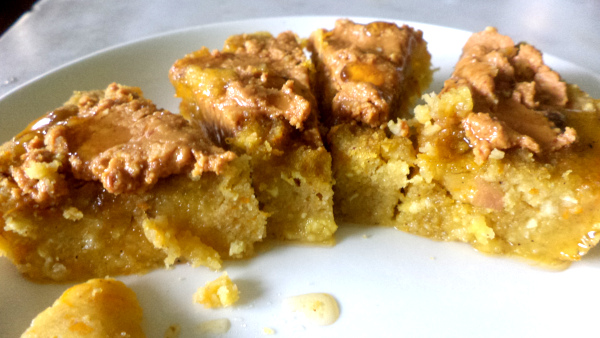Microwave kanki/conkie, Blackness and Emancipation 2022...
"What is dat?" the 16 year old asks me when I tell him the holiday is for Emancipation. He moves between two houses on the East Coast and in Georgetown. Descendant of enslaved Africans and indentured Indians, he often tells me about skin care, hair care, Youtube videos, wanting to do art, going to two churches and lessons.
He doesn't recall Emancipation. Maybe because Emancipation falls in the school holidays, so he would not see it. I try to explain, but he does not seem to care much. He is more animated explaining to me why I should not bathe two times a day - preserve the natural oil on the skin.
Emancipation Delight
I can't blame him though. I have reduced Emancipation to the possibility of kanki (or conkie), various types of pone and other foods, and watching people wearing 'African' clothes. Emancipation Delights are on sale at a food place not far from me. I walk down the road, stumbling on the uneven pavement, walking around the parked vehicles.
The delights are not bad when you cannot make your own. Or sun too hot to grate coconut, pumpkin, whatever else.
This laziness in my head. This week, a discussion on Black Feminism opened up discussions on what a 2022 social justice agenda looks like.
Discussions on what is Blackness and who can claim Blackness and who are excluded, especially in the Caribbean. And how when some assert Black power to oppress Black and other people, how there are oppressive forms of Blackness which have to be called out (or called in).
The women who organised the discussion proposed a definition of Black Feminism as "... an understanding of all forms of oppression as interlocking – i.e. racism, sexism, homophobia, classism, ableism, transphobia, xenophobia, among others – and the struggle to end these forms of oppression that continue to impact people of African descent..."
In Guyana and the Caribbean, these people of other origins are impacted by these forms of oppression.
And People of African Descent and of other origins are also involved in promoting these forms of oppression.
The Slavery Abolition Act of 1834 did not mean freedom for everybody, and has not meant freedom and equality for everybody.
Independence did not mean Independence for many of us, while also shattering ideas of inter-dependence.
And forgetting that we are inter-dependent with the natural environment and the climate and now having to hold back on destroying the environment as part of liberation. Did Exxon send Happy Emancipation Greetings?
Friday night and there is nasty cussing from a man of Indian origins. Find out later he is drunk. Western side of the house. Eastern side of the house, nice hard working couple descended from the enslaved and indentured cuss and holler, beat at their children while cooking , cleaning and looking after them. I go over for the first time in my life to ask to turn down music one day.
The woman apologises. But she said the children like the music and she don't have to holler at them so much.
The trucks which have moved into the business which should not be here are destroying the parapet. The drivers curse the neighbours who ask them to move the trucks which belong ironically to a scrap metal business. Over the road the property rented to the Oil people.
The land covered with scrap metal, gasoline drums, concrete used to ahve rose trees, cassava, ochro, jamoon tree, bread and cheese tree - sometimes occupied by people descendend from indentured labourers who also cursed and were violent with each other.
Progress though which meant destroying the trees and covering the earth with concrete for the scrap metal which would have come from the earth, does not mean breaking the intergenerational violence as the cursing continues.
Microwaving kanki
Take the coconut out of the freezer to make some coconut milk for aloo and channa curry. Pumpkin out of the fridge to cook.
Thinking of kanki. Do I go in the hot sun to the National Park to buy?
Can't I make my own? Cornmeal in the fridge.
Try a thing.
Ignore the banana suckers in the back yard. Take some of the coconut and throw in a microwave bowl. Grate some of the pumpkin which already chipped up to cook.
Throw two tablespoons of corn meal. Some elaichi, Cinammon. Margarine. Grate a piece pineapple. Smash a banana. I don't worry with blackpepper or ginger.
There is something about putting these things in a bowl like doing some kind of offering, asking for forgiveness of the ancestors for not following the labour but invoking them.
Passing heresy off as new ritual of honouring ancestors.
And I claim the enslaved as ancestors because they worked this place where I walk and I have to claim oneness with their descendants - oppressors or not as I have with the descendants of all who worked on this land marked by a border defined by neither them nor me.
No sugar not because of politics about sugar and slavery, but because of the legacy of diabetes which affects descendants of the enslaved and indentured.
Throw some of the coconut milk. Mix. Microwave for 2 minutes. Then another minute.
Not sure which tradition this is.
The peanut butter is from a business owned by a Black woman who markets with sustainability in mind. The peanuts are ground there on the premises.
The honey is from a Black man who continues to innovate and try new things in his own way and to make Guyana his own place.
The kanki taste good, satisfying. Not the real thing, or maybe it is a new real thing.
Quick and easy.
Unlike the Emancipation work which still has to be done.




Comments
Post a Comment